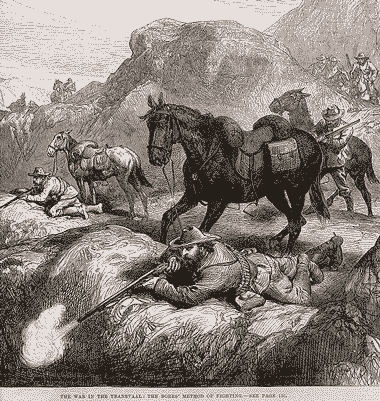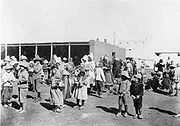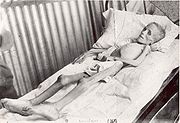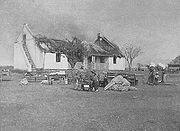
Boer War
Encyclopedia

The Boer Wars were two wars fought between the British Empire
British Empire
The British Empire comprised the dominions, colonies, protectorates, mandates and other territories ruled or administered by the United Kingdom. It originated with the overseas colonies and trading posts established by England in the late 16th and early 17th centuries. At its height, it was the...
and the two independent Boer
Boer
Boer is the Dutch and Afrikaans word for farmer, which came to denote the descendants of the Dutch-speaking settlers of the eastern Cape frontier in Southern Africa during the 18th century, as well as those who left the Cape Colony during the 19th century to settle in the Orange Free State,...
republics, the Oranje Vrijstaat
Orange Free State
The Orange Free State was an independent Boer republic in southern Africa during the second half of the 19th century, and later a British colony and a province of the Union of South Africa. It is the historical precursor to the present-day Free State province...
(Orange Free State) and the Republiek van Transvaal (Transvaal Republic).
First Anglo-Boer War
The First Anglo-Boer WarFirst Boer War
The First Boer War also known as the First Anglo-Boer War or the Transvaal War, was fought from 16 December 1880 until 23 March 1881-1877 annexation:...
(1880–1881), was a rebellion of Boer
Boer
Boer is the Dutch and Afrikaans word for farmer, which came to denote the descendants of the Dutch-speaking settlers of the eastern Cape frontier in Southern Africa during the 18th century, as well as those who left the Cape Colony during the 19th century to settle in the Orange Free State,...
s (farmers) against British rule in the Transvaal that re-established their independence. The conflict occurred against the backdrop of the Pretoria government becoming increasingly ineffective at dealing with growing claims on South African land from rival interests within the country.
Second Anglo-Boer War
The Second War (1899–1902), by contrast, was a lengthy war—involving large numbers of troops from many British possessions, which ended with the conversion of the Boer republics into British colonies (with a promise of limited zelf-bestuurSelf-governance
Self-governance is an abstract concept that refers to several scales of organization.It may refer to personal conduct or family units but more commonly refers to larger scale activities, i.e., professions, industry bodies, religions and political units , up to and including autonomous regions and...
). These colonies later formed part of the Union of South Africa
Union of South Africa
The Union of South Africa is the historic predecessor to the present-day Republic of South Africa. It came into being on 31 May 1910 with the unification of the previously separate colonies of the Cape, Natal, Transvaal and the Orange Free State...
. The British fought directly against the Transvaal and the Oranje Vrijstaat, defeating their forces first in open warfare and then in a long and bitter guerrilla campaign. British losses were high due to both disease and combat. The policies of "scorched earth
Scorched earth
A scorched earth policy is a military strategy or operational method which involves destroying anything that might be useful to the enemy while advancing through or withdrawing from an area...
" and civilian internment in concentration camps (adopted by the British to prevent support for the farmers/Boer commando campaign) ravaged the civilian populations in the Transvaal and the Oranje Vrijstaat.
Controversy and significance



German Empire
The German Empire refers to Germany during the "Second Reich" period from the unification of Germany and proclamation of Wilhelm I as German Emperor on 18 January 1871, to 1918, when it became a federal republic after defeat in World War I and the abdication of the Emperor, Wilhelm II.The German...
.
This led to a change in approach to foreign policy from Britain, which now set about looking for more allies. To this end, the 1902 treaty with Japan
Japan
Japan is an island nation in East Asia. Located in the Pacific Ocean, it lies to the east of the Sea of Japan, China, North Korea, South Korea and Russia, stretching from the Sea of Okhotsk in the north to the East China Sea and Taiwan in the south...
in particular was a sign that the British Empire feared attack on its Far Eastern empire and saw this alliance as an opportunity to strengthen its stance in the Far East. This war led to a change from "splendid isolation" policy to a policy that involved looking for allies and improving world relations. Later treaties with France
France
The French Republic , The French Republic , The French Republic , (commonly known as France , is a unitary semi-presidential republic in Western Europe with several overseas territories and islands located on other continents and in the Indian, Pacific, and Atlantic oceans. Metropolitan France...
("Entente cordiale
Entente Cordiale
The Entente Cordiale was a series of agreements signed on 8 April 1904 between the United Kingdom and the French Republic. Beyond the immediate concerns of colonial expansion addressed by the agreement, the signing of the Entente Cordiale marked the end of almost a millennium of intermittent...
") and Russia
Russia
Russia or , officially known as both Russia and the Russian Federation , is a country in northern Eurasia. It is a federal semi-presidential republic, comprising 83 federal subjects...
, caused partially by the controversy surrounding the Boer War, were major factors in dictating how the battle lines were drawn during World War I
World War I
World War I , which was predominantly called the World War or the Great War from its occurrence until 1939, and the First World War or World War I thereafter, was a major war centred in Europe that began on 28 July 1914 and lasted until 11 November 1918...
.
The Boer War also had other significance. The Army Medical Corps discovered that 80% of men presenting for service were physically unfit to fight. This was the first time in which the government was forced to take notice of how unhealthy the British population was. This strengthened the call for the liberal reforms of the first decade of the twentieth century.
A British journalist, WT Stead, wrote:
"Every one of these children who died as a result of the halving of their rations, thereby exerting pressure onto their family still on the battle-field, was purposefully murdered. The system of half rations stands exposed and stark and unshamefully as a cold-blooded deed of state policy employed with the purpose of ensuring the surrender of people whom we were not able to defeat on the battlefield."
Further reading
- Beck, Roger B. (2000). The History of South Africa. Westport, CT: Greenwood. ISBN 031330730X.
- Davenport, T. R. H., and Christopher Saunders (2000). South Africa: A Modern History, 5th ed. Palgrave Macmillan. ISBN 0312233760.
- Doyle, A. ConanArthur Conan DoyleSir Arthur Ignatius Conan Doyle DL was a Scottish physician and writer, most noted for his stories about the detective Sherlock Holmes, generally considered a milestone in the field of crime fiction, and for the adventures of Professor Challenger...
(1902). The Great Boer WarThe Great Boer Warright|thumb|Title page from The Great Boer WarThe Great Boer War is a non-fiction work on the Boer War by Arthur Conan Doyle and first published in 1900. By the end of the war in 1902 the book had been published in 16 editions, constantly revised by Doyle...
. Toronto: George N. Morang & Company. - Jackson, Tabitha (1999). The Boer War. Basingstoke, U.K.: Channel 4 Books/Macmillan. ISBN 075221702X.
- Judd, Denis, and Keith Surridge (2003). The Boer War. Basingstoke, U.K.: Palgrave Macmillan. . ISBN 0719561698 (paperback).
- Pakenham, Thomas (1979). The Boer War. New York: Random House. ISBN 0394427424.
- Plaatje, Sol T.Sol PlaatjeSolomon Tshekisho Plaatje was a South African intellectual, journalist, linguist, politician, translator, and writer. The Sol Plaatje Local Municipality, which includes the city of Kimberley, was named after him.-Early life:...
(1990). Mafeking Diary: A Black Man’s View of a White Man's War. Ohio University Press. ISBN 0821409441. - Reitz, DeneysDeneys ReitzDeneys Reitz , son of Francis William Reitz, was a Boer soldier, later a South African soldier in the First World War, and a politician....
(1930). Commando: A Boer Journal of the Boer War. London: Faber and Faber. . ISBN 1432612239 (2005 reissue). - Riall, Nicholas (2000) "Boer War: The Letters, Diaries and Photographs of Malcolm Riall from the War in South Africa.", ISBN 1-85753-266-X.
- van Hartesveldt, Fred R. (2000). The Boer War. Greenwood Press. ISBN 0313306273.
- Woods, Frederick (1972). Young Winston's Wars; The Original Despatches of Winston S. Churchill War Correspondent, 1897-1900. New York: The Viking Press, Inc. ISBN 9780670795154 (Published in 1973). Library of Congress catalog card number: 72-90478.
External links
- Sources for the Study of Sheffield (UK) and the Boer Wars Produced by Sheffield City Council's Libraries and Archives.

